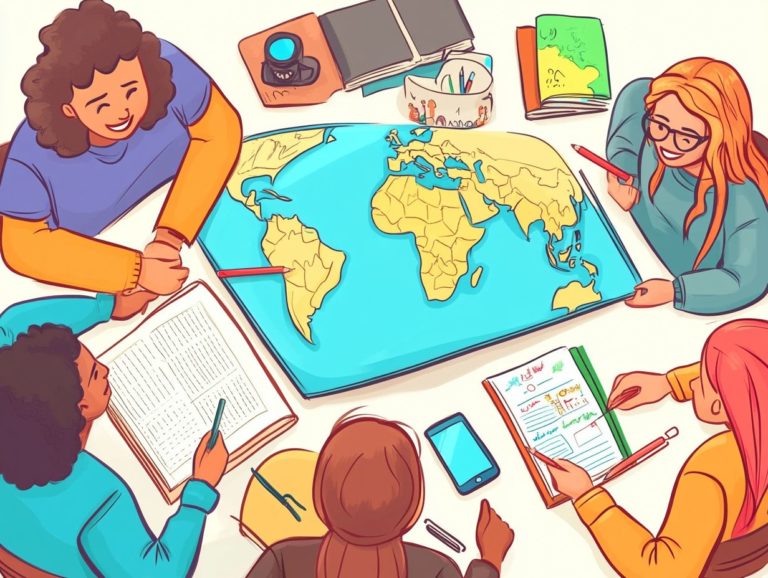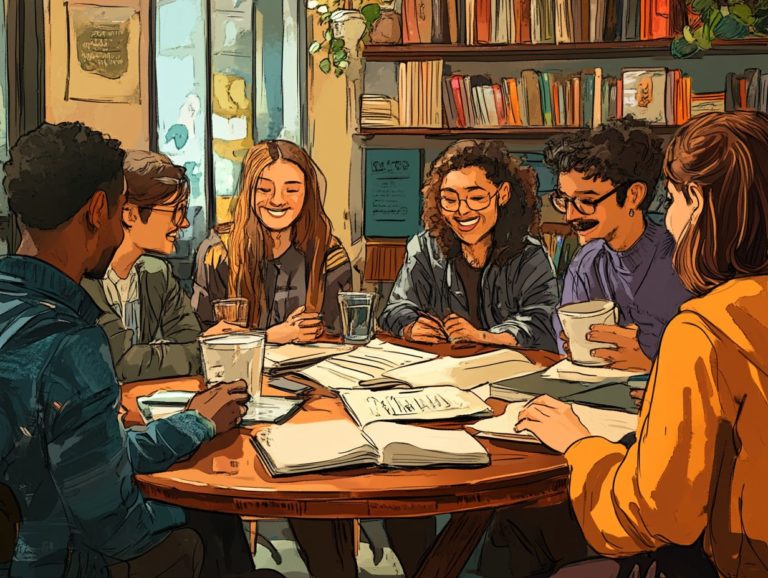5 Mistakes to Avoid When Learning a New Language
Learning a new language is an exhilarating yet challenging journey. As a language learner, you may find yourself inadvertently falling into common pitfalls that could impede your progress.
From setting unrealistic goals to relying too heavily on translations, these missteps can overshadow the joy of mastering a new skill. Let s explore five critical mistakes you must avoid while offering insights on effective practice techniques, ways to immerse yourself in the language, and tips for appreciating the culture woven into the words.
Prepare to elevate your language-learning experience!
Contents
- Key Takeaways:
- 1. Not Setting Realistic Goals
- 2. Not Practicing Consistently
- 3. Relying Too Much on Translation
- 4. Not Immersing Yourself in the Language
- 5. Not Learning About the Culture
- What Are the Benefits of Learning a New Language?
- Frequently Asked Questions
- What are the 5 mistakes to avoid when learning a new language?
- Why is it important to set clear goals when learning a new language?
- How can I ensure that I am practicing consistently when learning a new language?
- Why is immersion important when learning a new language?
- Which resources should I use when learning a new language?
- Is it okay to ask for help when learning a new language?
Key Takeaways:
- Setting realistic goals is crucial; it helps you create a clear roadmap and stay motivated.
- Consistent practice is key make sure to dedicate time regularly to retain your new skills.
- Instead of relying purely on translations, try thinking directly in the new language for better fluency.
1. Not Setting Realistic Goals
Many language learners embark on their foreign language journey without setting realistic goals, which can lead to frustration and burnout. They grapple with the intricacies of vocabulary, pronunciation, and grammar. By establishing achievable milestones, you can maintain motivation and effectively track your progress while enhancing your language skills.
Setting realistic goals is essential for sustaining long-term interest and commitment to the learning process. For instance, rather than proclaiming the ambition to “become fluent in a year,” focus on mastering 50 new words each month or holding a 10-minute conversation after three months.
Employ a method that helps you set clear and achievable goals, ensuring that each goal aligns with your current level and abilities. Successful language learners often document their journeys and celebrate each small victory like completing a module on a language app which fosters a sense of accomplishment and drives motivation for the next challenge.
2. Not Practicing Consistently
Consistency in practice is essential for you as a language learner. Irregular study sessions can really throw a wrench in your vocabulary retention, speaking skills, and overall fluency.
Establishing a structured practice schedule can elevate your journey toward mastering a new language. By dedicating specific time blocks each day or week, you can cultivate a routine that fosters steady improvement.
Engaging with interactive software and language apps can also make your practice enjoyable. Many of these resources offer gamified learning experiences that enhance retention and keep you motivated. Incorporate diverse methods, such as conversing with native speakers or seeking help from online tutors, for invaluable real-world context.
This approach enriches your learning experience, refining your speaking skills while boosting your confidence and helping you adapt to various dialects and slang.
3. Relying Too Much on Translation
Many language learners often fall into the trap of over-relying on translation, which can significantly impede their comprehension skills and hinder their ability to think in the foreign language. This excessive dependence on translation frequently results in misunderstandings, as nuances and cultural context may slip through the cracks.
Habitual translation can create a mental barrier that restricts your fluency and spontaneity in using the language. Instead, embrace alternative techniques that prioritize immersive practices, such as engaging with native speakers. This approach fosters a more natural acquisition of the language.
Focus on authentic materials like books, films, or music to experience the language as it is genuinely spoken. Try vocabulary expansion exercises that encourage active recall and contextual usage to help you build a stronger, more intuitive grasp of the language, ultimately leading to greater confidence and fluency.
4. Not Immersing Yourself in the Language
Failing to immerse yourself in the language limits your exposure to authentic materials and cultural details, which are vital for building meaningful language skills. To improve this, consider following these 5 steps to enhance your language learning experience.
To really get a language, you need to engage with it outside the traditional classroom. Language exchange programs let you practice speaking with native speakers, creating a community where you learn from each other.
Traveling to a country where the language is spoken helps you have real-life interactions. You ll experience the culture in ways textbooks can’t match!
Integrating podcasts and movies in the language into your daily routine can improve your understanding and listening skills. Learning becomes an enjoyable journey.
Embracing these opportunities boosts your fluency and enriches your ability to communicate effectively.
5. Not Learning About the Culture
Understanding the culture behind a foreign language is essential. It enhances your learning experience and communication skills.
When you dive into the history, customs, and beliefs tied to a language, you grasp not just the words but also the small details and ways of expression. This understanding shapes your vocabulary and helps you navigate social interactions easily.
You can connect with cultural artifacts to deepen this understanding:
- Literature provides insights into the values and norms of speakers.
- Music lets you appreciate emotional expressions linked to phrases.
- Historical narratives help you understand how the language has evolved.
This mix of activities will really boost your language skills!
What Are the Benefits of Learning a New Language?
Learning a new language offers many benefits beyond vocabulary. It improves your thinking skills, sharpens communication, and increases cultural awareness.
As you learn new words and grammar, your problem-solving skills get better. You gain tools to tackle challenges and think critically.
Many students report amazing experiences from learning languages. One found exciting job opportunities abroad, while another saw their analytical skills improve in other subjects.
These benefits show that diving into a foreign language enriches your personal and professional life. It also helps you develop an adaptable and innovative mindset.
How Can Setting Goals Help with Language Learning?
Setting clear learning goals can enhance your language journey. It offers motivation and a way to track your progress.
Divide your objectives into short-term and long-term targets. Short-term goals, like mastering vocabulary, give you immediate satisfaction.
Long-term aspirations, such as achieving fluency, offer a bigger vision for your language journey.
By aligning these goals with your personal learning style, whether you learn best by listening, seeing, or doing, you can customize your approach. This strategy boosts your motivation and makes your learning more effective.
What Are the Best Ways to Practice a New Language?
To truly master a new language, you should embrace a blend of interactive software, language apps, and conversational practice with native speakers. This comprehensive approach ensures you re not just scratching the surface but diving deep into the nuances of the language.
Incorporating tools like language exchange platforms, online quizzes, and even gamified learning apps can significantly enhance your experience and keep your motivation soaring. It s essential to establish a balanced practice schedule that alternates between receptive skills like listening to podcasts or reading articles and productive skills, such as writing journal entries or engaging in speaking exercises.
This variety not only keeps your learning journey dynamic but also solidifies your overall command of the language. Regularly assessing your progress through self-testing and adjusting your practices accordingly will further support your sustained improvement.
Why Is Translation Not Always Reliable?
Translation is not always the most reliable companion in your language learning journey. It often misses small differences in how language is used, leading to misunderstandings and mistakes that can trip you up.
When you rely solely on translation, you risk creating a disconnect between yourself and the target language, limiting your access to its rhythm and rich cultural context. This approach can narrow your exposure to real-life conversational nuances, idiomatic expressions, and the varied sentence structures that native speakers use effortlessly.
Focusing too much on translation can stifle the development of your essential comprehension skills, making it difficult for you to think and communicate fluidly in your new language. Instead, consider embracing immersive techniques like listening to native speakers, reading authentic materials, or dive into interactive conversations. These methods pave the way for a deeper understanding, allowing you to naturally absorb the language’s flow and meaning. This fosters a more instinctual command of its unique characteristics.
How Can Immersion Speed Up the Learning Process?
Immersion can dramatically accelerate your language learning journey, placing you in authentic contexts that enhance your fluency and cultural understanding.
This method helps you learn vocabulary and grammar, and gives you the power to navigate real-life conversations and social situations with greater ease. By engaging directly with native speakers or participating in cultural activities, you can pick up on the subtle nuances in communication styles and behaviors that often elude traditional classroom instruction.
To craft meaningful immersion experiences, consider the following:
- Attending local festivals: Engage with the language in a lively atmosphere.
- Joining community groups: Centered around a specific culture, these groups provide real-life practice.
- Exploring online language exchange platforms: Connect with others who are also learning.
These strategies will deepen your connection to the language and its speakers while reinforcing the practical skills essential for real-world interactions.
Why Is Understanding the Culture Important in Language Learning?
Understanding the culture tied to a foreign language is essential for you as a language learner; it enriches your experience and encourages the use of meaningful language in context.
When you grasp the nuances of cultural traditions, customs, and societal norms, you start to appreciate not just the vocabulary and grammar, but also the context in which certain phrases are employed. For instance, greetings can vary significantly some languages use formal structures in professional settings while opting for casual expressions among friends. Festivals, food, and traditional practices hold specific references in language that, once understood, allow you to engage in deeper conversations and forge genuine connections.
To elevate your cultural education in language learning, consider exploring resources such as:
- Language exchange programs: Meet others who are also learning.
- Cultural workshops: Immerse yourself in the traditions.
- Online platforms focused on cultural history and contemporary societal issues: Gain valuable insights.
These resources make your journey to mastering a new language feel more authentic and applicable.
Frequently Asked Questions
Here are some common questions about learning a new language:
What are the 5 mistakes to avoid when learning a new language?
The 5 mistakes to avoid when learning a new language are:
1) Not setting clear goals, 2) Not practicing consistently, 3) Not surrounding yourself with the language, 4) Not using resources effectively, and 5) Not asking for help when needed can hinder your progress. For those on a budget, consider these quick tips for language learners to enhance your learning experience.
Why is it important to set clear goals when learning a new language?
Setting clear goals helps you stay motivated and focused on your language learning journey.
You ll love tracking your progress and celebrating every milestone!
How can I ensure that I am practicing consistently when learning a new language?
Consistency is key when learning a new language.
You can ensure this by setting a regular study schedule and finding ways to incorporate the language into your daily life.
Hold yourself accountable by tracking your progress.
Why is immersion important when learning a new language?
Surrounding yourself with the language is crucial for developing fluency and natural speaking abilities.
This includes exposing yourself to the language through media, speaking with native speakers, and traveling to a country where the language is spoken.
Which resources should I use when learning a new language?
There are many resources available for language learning, but it’s important to choose ones that suit your learning style and goals.
This can include textbooks, online courses, language exchange programs, and language learning apps.
Language exchange programs connect learners with native speakers to practice conversation.
Is it okay to ask for help when learning a new language?
Absolutely! Asking for help is important when you need it.
It s a sign of dedication and determination in your language learning journey.
You can seek help from teachers, tutors, language exchange partners, or even online communities and forums.
Don t hesitate to ask for help; it s part of the fun!





